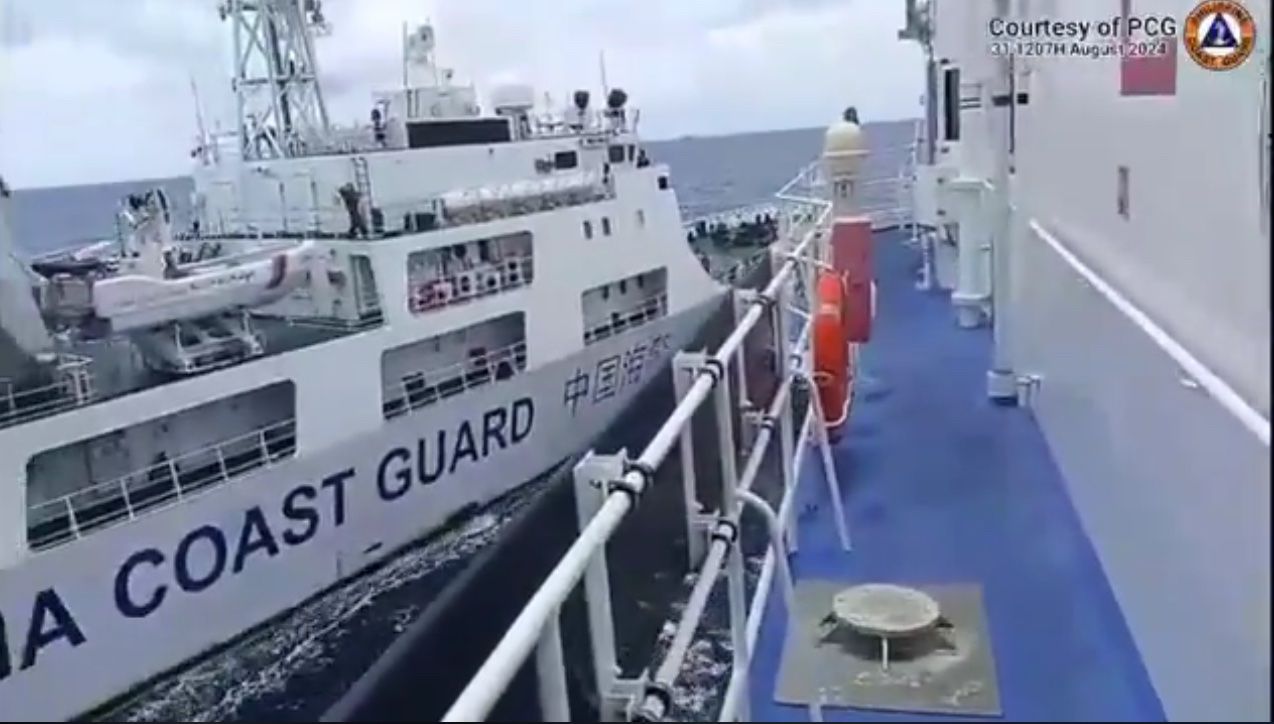Foreign envoys fault China for 'repeated' int'l law violations in sea row
Amid the repeated ramming of BRP Teresa Magbanua near the Escoda Shoal by the China Coast Guard (CCG), foreign ambassadors condemned Beijing for the “repeated” incidents that violate international law and the sea code.
 China Coast Guard vessel collides with BRP Teresa Magbanua of the Philippine Coast Guard in Escoda Shoal on Aug. 31, 2024. (Screengrab from PCG)
China Coast Guard vessel collides with BRP Teresa Magbanua of the Philippine Coast Guard in Escoda Shoal on Aug. 31, 2024. (Screengrab from PCG)
Japanese Ambassador to Manila Endo Kazuya, who reshared on X (formerly Twitter) a post by National Task Force for the West Philippine Sea (NTFWPS) posted by its spokesman and Philippine Coast Guard (PCG) Commodore Jay Tarriela about the incident, called out China for attempting to change the status quo in the region.
“As a stakeholder of SCS, seriously concerned over the repeated incidents including yesterday’s collision by a CCG vessel against a (Philippine) vessel,” he wrote.
“(Japan) opposes any unilateral attempts to change the status quo by force or coercion. (Japan) stands together with (the Philippines) by upholding rule of law at sea,” the ambassador added.
United States Ambassador MaryKay Carlson likewise condemned the newest intrusion into Philippine waters.
“The U.S. condemns the multiple dangerous violations of international law by the PRC, including today's intentional ramming of the BRP Teresa Magbanua while it was conducting lawful operations within the (the Philippines) EEZ,” she said.
“We stand with the Philippines in upholding international law,” she added, while also sharing Tarriela’s post of videos showing the CCG repeatedly ramming the BRP Teresa Magbanua.
European Union Ambassador to the Philippine Luc Veron also expressed the regional bloc’s concern over the situation in the South China Sea.
“Deeply concerned with the repetition of incidents, the EU reiterates its call for observance of freedom of navigation and maritime safety in the South China Sea, in accordance with International Law,” he wrote.
According to Tarriela, a CCG vessel repeatedly rammed the BRP Teresa Magbanua, which has been deployed to the shoal since April 15, on Saturday, Aug. 31, at around 12:07 p.m.
The vessel sustained damages on its bridge wing and freeboard, while a hole was also causes by the collision.
This was not the first incident in waters near the Escoda Shoal, which sits 75 nautical miles or about 140 kilometers off Palawan and is deep within the Philippines’ 200-nautical-mile exclusive economic zone (EEZ).
On Aug. 25, a Bureau of Fisheries and Aquatic Resources (BFAR) vessel was hit by a CCG ship and on Aug. 22, China used flares against the BFAR’s Cessna 208B Grand Caravan plane from from China-occupied Zamora (Subi) Reef.
China’s aggressive actions in the region is based on its stand that it owns almost the entire South China Sea, up to the EEZs of its neighbors. It also continues to reject a 2016 Arbitral Tribunal ruling that invalidated its nine-dash-line, later upgraded to 10-dash-line, claim.